Chuck Wendig's Blog, page 18
December 28, 2023
Digging A Grave For 2023, As 2024 Struggles To Be Born
Well! I see we find ourselves once again at the turn of the tide. The one year recedes. Another year washes up in its place, eating all the sandcastles you made. Washing away your footprints. Time, and life, and the universe —
They go on.
This peculiar moment is both an excellent time for reflection and a piss-poor time for reflection — the former because, it is useful to take stock, and what better moment than during this interstitial notimeplace? The latter because, we are in the interstitial notimeplace. I don’t know what day it is, so how the fuck am I expected to look both backward and forward with any effectiveness at all? I can’t remember shit. I don’t even know who you people are or how you got here. I’m pretty sure it’s The Fifth Garblesday, or maybe Bleenstag. I’m wearing underpants on my head and pants on my arms. I am half-chocolate and half-cheese. It’s foggy out. It’s foggy in. Everything is Betwixt. But this is all my problem, not yours.
I shall rally. I shall muster. I SHALL FORTIFY.
To reflect back: 2023 was, personally, I suppose, a pretty good year. I wrote and sold a new middle grade, Monster Movie!, and yes, that exclamation point is part of the title because fuck yeah, let’s exclaim excitedly about things. I published my next adult horror novel, Black River Orchard, which to my shock and awe became a USA Today bestseller? Got to go on tour for that book, as well, which was a true delight — I met cool readers, ate weird apples, got to hang out with the writerly likes of Paul Tremblay and Aaron Mahnke and Chris Golden and Sadie Hartmann and Clay McCleod Chapman and Owen King and of course Kevin Hearne and Delilah Dawson. Plus, I got to visit some of the greatest bookstores in the country. Especially ones I’d never been to, like Montana Book Co and Gibson’s.
It was genuinely fucking great.
(And in case people are like, but book tours aren’t effective, why do you think Orchard hit the USA Today list? Because of bookstore visits.)
(Also: thanks to Powell’s this morning — particularly, Nick K! — for putting Black River Orchard on his top five staff picks of 2023.)
Plus, there was Gentle Writing Advice this past summer, too — which I hope has been helping people navigate the labyrinth of a writing life. I know I needed to write it — I needed to talk about navigating the creative and emotional challenges of the modern age, and also I needed the book as a response to me, where I got to use the book as a weird, I dunno, remix or rebuttal or reconsideration of who I am as a writer. But also ideally for those writers out there who know that this thing we do is work, that it’s hard, that it’s satisfying, that it’s challenging, and that to do it requires a measure of mindfulness and self-care. And the book is very much about that, and also about challenging the idea of self-care, too, to become a more nuanced and meaningful aspect of your work. It’s not just about HAVE A DONUT, but about how taking yourself and your work seriously is itself a form of self-care, you know? Anyway. So that came out.
Wayward hit paperback. That’s good, too, though I still meet people who loved Wanderers and don’t realize it has a sequel? (Whispers: it has a sequel. It’s called Wayward. Pass it on.)
Oh, and I was on the cover of a magazine?? What the fuck is that? Who lets that happen? Writer’s Digest did, apparently.

Life was, mostly, pretty good? My family is good. Kid is nailing school and now, the electric guitar. (He’s been playing since he was in kindergarten but I think the electric opened him up to the experience in a big way.) He’s getting older now and that’s weird and wonderful and awful, because you see TIME ITSELF cascading past like the scenery on a long car ride, and you see it in their faces and how tall they’re getting and in the cracking voice and in the books they’re reading, and, and, and. It’s great. But also, oof.
Saw Yeah Yeah Yeahs in concert. That was amazing. Some bands you see live and you realize, yeah, fuck, they’re better on the album. But YYYs fucking bring it. Legit amazing show.

Went to Europe for the first time — Netherlands, Germany, Spain. Truly amazing. Beautiful experience. Best travel I’ve ever done, hands down. Thinking of going back this next year. Portugal, maybe.
Got COVID. Wouldn’t recommend it. Zero stars. Had Pax-Mouth, which was like licking a robot’s corroded asshole. Was not the worst I’ve ever been sick but you can definitely feel like, without vaccines and other remediations, COVID could definitely kick down the gate and escape containment inside your body real fucking quick.
Globally, shit kinda sucked. All over the place. I mean, I suppose in a ‘grand scheme’ sorta way, there’s a lot of THINGS SUCK every year, and I do think it’s important to also recognize THINGS DON’T SUCK IN EVERY DIRECTION AND SOMETIMES GOOD THINGS HAPPEN TOO. But it’s hard not to look at climate change and rising vaccine denial and Israel/Palestine and marching fascism and feel like, “we’re really nailing it right now.” But, but, but, locally, at least, I’ll note: we kicked Moms For Liberty out of our school district. And M4L is dying fast on the vine right before our very eyes, and that’s something I’ll cherish forever.
The death of Twitter was a real good news bad news thing — good news because, honestly, Twitter had gone rotten long before Musk took over, and he just pulped it into rancid wine and tried to make everyone drink it. But losing it sucked, too, because you lose real connections, real community, and also for creatives, we lost a pretty useful way to reach the audiences we have earned there. But it’s hard to be there and stay there and support that place. (See also: Substack, now. If you’re on it, I’d start finding a way off it.) Bluesky has been a pretty great replacement. Threads less so — it’s good in a lot of ways, but just this week alone there’s been a lot more FIGHTY RAGEBAIT ENGAGEMENT going on and it’s tiresome and also the UI is fucking Byzantine.
The continued rise of AI in art and writing is hopefully soon going to do what all of these (at the core) lazy get-rich-quick bullshit jawns do over time — like NFTs and all that shit, I’d love to see the air leak out so I can watch the balloon squeak around the room in a pathetic death spiral. It’s theft, and a lazy theft at that — you know it’s theft because, as others have said before me, it wouldn’t exist without other art and writing doing the work of pre-existing. It feeds on that, chews it up, spits it back out. Folks who use it, they just have an idea and want a Work Button to make the robot shit out their idea. But even there, the execution is based on everybody else’s work, not your own mind — you just fed it a line of words and now it’s crapping out a digitized regurgitate of someone else’s effort. (Never mind the environmental impact.)
Let’s be shut of it.
ANYWAY.
So, 2024.
Um. Whew. Yeah. I dunno!
There are of course concrete things I’ve got going on — I have to finish The Staircase in the Woods and send that off to the editor. I have to pitch my next middle grade. I’ll have Monster Movie! out in the world come late September. I’ll soon show you a cover for that and a cover for the paperback version of Black River Orchard, too.
I think the hardest thing that’ll happen professionally this year will be having to pitch new books — you know, a writing career, I often note, is one of peaks and valleys, and more to the point, cliffs you’re always about to drive off of, and so much of our careers are spent simply trying to furiously get a ramp built at the edges so we can jump the valleys instead of crashing down into them. And that means this year is one of those inflection points where I have to see if the ramps I’ve been building will carry my ass over the void and to the next stable landmass, or if I’m going to be extracting myself from a fiery wreck and have to climb back up and out. There’s no shame in that, it happens to all of us, we all have careers that catch fire once in a while, but obviously the hope is, the ramp holds, and I jump the gap.
HOLD MY HAND LIKE WE’RE THELMA AND LOUISE
Publishing is definitely continuing its trend of “going through some things,” and it’s always weird any given year but the weirdness quotient seems to have gone up, up, up. And that’s for a lot of reasons, I suspect. The rise of AI, the impact of pandemic emotions and trauma, the cascading weirdness of inflation slash greedflation, the crash-and-burn of reliable social media. Best we can do is hold tight to the bucking beast and try not to get thrown.
Otherwise, who knows? I can’t predict what the year will bring. I will try to enter it creatively and with curiosity and with compassion — I enter it with the desire to keep telling stories and keep reading them in turn. I’ll travel, long as the pandemic lets me. I’ll keep trying to blog here, because it remains a stable place for me to set up shop and say my silly bloviating shit. And I hope you’ll keep coming along with me here, too, on whatever this odd journey is, until this odd journey ends. (Which, hopefully, will be a good long time from now, but that’s never guaranteed, is it?)
All right. To close it out, here are some of my favorite photos of the past year.
Have a wonderful NYE, don’t drink lighter fluid, do kick 2023 out the door with the heaviest boot you can find, let’s all wish each other the best version of ourselves in the year going forward, and I’ll see you next week sometime with my “writerly resolution” for 2024.
BYEEEEEE











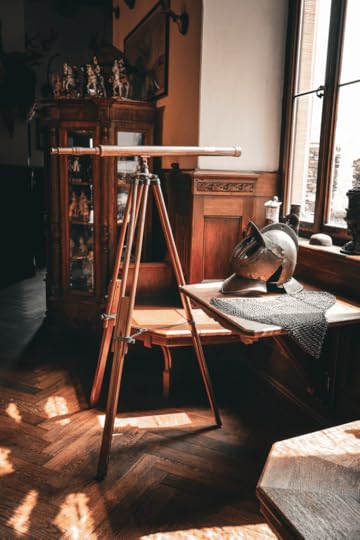






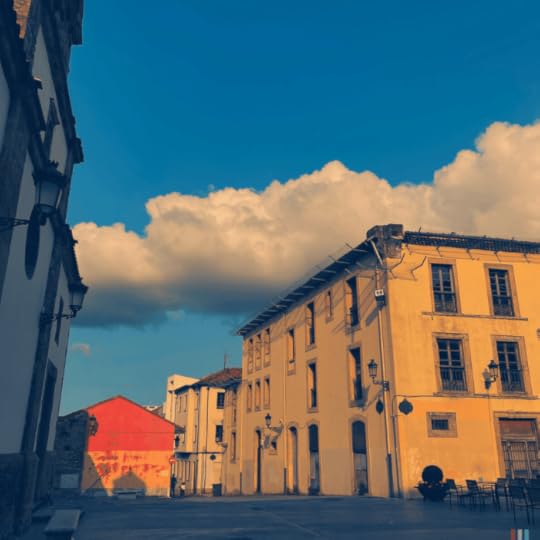

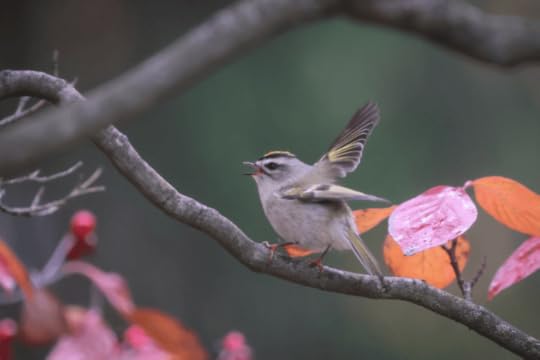


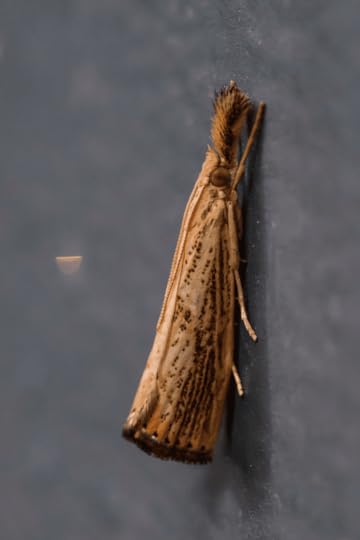



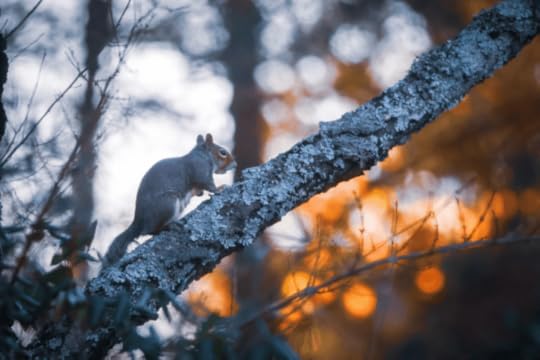
December 26, 2023
Why Aren’t There More Pandemic Novels, Anyway?

It’s weird being in the midst of a pandemic and then watching a film or a show or reading a book set in the absolute present where… there appears to have never been a pandemic. Right? Everybody just gets in elevators and on planes, unmasked; they share food; they cram into crowded bars; nobody tenses up when they’re in a movie theater and they hear someone cough not once, not twice, but three times which to me is always the Bat Signal for, “this motherfucker is about to give me COVID, isn’t he?”
Why is this, exactly? Why does fiction — whether on our screens or on the page — seem to want to avoid the subject? This question popped up on Bluesky (Katie Mack was talking about it, and Sarah Weinman, and then some other authors jumped in) and I find it to be a really interesting question without any single answer, but I do feel like I wanna explore it a little. So here are my (admittedly quite hasty) thoughts —
a) If it’s a book, you have to understand, publishing is glacial. A book you read in the last year was written more than a year before it hit shelves, and maybe even longer ago — as such, it was possibly being written in the midst of the first year or two of COVID, which is to say, during a rather chaotic period of history that is hard to immediately replicate. The story you want to tell may not easily accommodate a months-long lockdown or mask-wearing or even the political shit-show that (by and large) right-wingers turned basic science into. It’s like, once you start talking about the pandemic, you kinda have to talk about Trump and maybe Biden and honestly, a lot of that actual reality ended up more surreal and satirical than your average bit of popular fiction. I mean, we had a president more or less advocating for shoving light bulbs up your ass to burn out the mean-bad virus, yeah? It feels like once you start to get into the weeds on COVID, you’re really really in the fucking weeds and — honestly, current fiction is not up to the task of merely glimpsing our current reality. It’s either a snout-to-tail full-throated turn-your-head-and-cough exam or it’s going to do a weak, watered-down job of it.
b) And, you know, fiction — particularly popular fiction — doesn’t often acknowledge The Big Shit. It just doesn’t. It’s safe to say that most fiction exists in a sort of interstitial alt-universe of each author’s making — most fiction doesn’t sit there and reference the dozen-plus Very Bad Things currently happening, from 9/11 to Trump to Ukraine to Israel/Palestine to school shootings to whatever. They might become background information — something a character says or thinks, or a news story someone hears. But it’s rarely foregrounded, because once you foreground, say, school shootings, now it’s a School Shooting Book or a School Shooting Movie and it’s almost as if the Troubling Topic becomes a subgenre in and of itself.
c) And that means you really don’t want to get it wrong. Or half-ass it. How often have you been watching a TV show where they’re like, “wow this pandemic is bad” during one episode and then by the next they mostly aren’t really acknowledging it anymore? It has this hand-wavey vibe to it. “We acknowledge the Very Bad Thing and made serious sounds and nodded our heads concerningly, but now it’s fixed.” It has that Very Special Episode vibe. “This episode is about Sexual Abuse, but next episode, nobody is going to remember any of this shit, welcome to the memory hole.” On the one hand, I suppose this is actually a fair representation of reality — because in this reality, we memory hole a lot of shit, including but not limited to the pandemic. And certainly both in fiction and in our lives we’ve seen or even experienced that sense of “well of course it’s real, but oops, I forgot my mask and I’m in a crowded grocery store, fingers fucking crossed, I guess, I’m sure it’s fine.” And it usually is fine, mostly, generally, so we grow comfortable and forget to do it more the next time and… so our overall carelessness grows. As such, I guess it’s fair to see that on TV, but it also feels all the more dismissive and shitty, somehow, and so I think I’d prefer to see it not acknowledged at all instead of just half-assedly pointed at as if to say, “Wow, remember that? Glad we dealt with it for one episode. Moving on, now.”
d) I’m very, very sure there is some pressure from publishers and film studios and such to scrape the pandemic from fiction. I’ve struggled with this in regards to climate change — it’s like, climate change is real, climate change is daily, and I often have characters reference it in passing, sometimes in real moments of anxiety and hey, sometimes as jokes. Not because it’s not HUGELY SERIOUS but because people are messy and we often deal with the absolutely worst shit with gallows humor. And I’ve gotten notes from editors that are like, is this too much, should we pull some of it out? Not the jokes — I mean, the inclusion of it at all. As in, if it’s not relevant to the story, why are they bringing this up? Nobody is forbidding me from including it, to be clear, but I think the note is a fair one. I’m writing books that ostensibly are meant as entertainment. I’m not actively trying to bum you out or remind you of the very real nightmares at your door. There’s a lot of talk sometimes about the “responsibility” an author has and I honestly cannot say what that responsibility is — it’s certainly not a hard-coded one, not a responsibility that is a true moral obligation, because that’s a slippery fish. But at the same time it’s kinda hard to try to write about real people and not have them suffer from… real problems and real anxieties and sometimes that means pointing at real shit going on. Which leads me to:
e) I don’t know that I always want to see it. Listen, sometimes I read books as a way to escape the *gestures broadly toward the outside world* — I think it’s fair to say the pandemic was, and arguably is, a mechanism for a certain kind of trauma. It was, and is, traumatic. And while fiction can be a uniquely good place to deal with that kind of trauma, fiction is also a very good place to either come at that trauma at an oblique angle or simply be a portal away from it. I’d argue this is probably why genres like romantasy and horror are both having a moment right now — they are particular forms of escapism. Horror is about the trauma, but not about the specific trauma: it’s like a narrative vaccine where we deal with existential terrors and the varieties of evil but at a way that is either parallel to or perpendicular to our current actual horrors. Side-booted exposure therapy, of a sort. Whereas romantasy — still dealing with and offering some very big feelings — is maybe a more overt doorway out of the current reality in which we live. And while I think some might have a dim view of both of these genres, I think readers are smart people who know what they want and know what their needs are — ironically, sometimes the effects of the pandemic on us (and lo, those effects are many) force us to mitigate the trauma of that time in whatever way we can. Fiction can deal with things head-on, at a side-angle, or by looking the other direction entirely — and sometimes that’s a fault of how we memory hole things, but sometimes I think it’s also a mentally protective measure.
More to the point, sometimes we want to look at a thing and study it.
And sometimes we’re too close to it, the wounds are too fresh — and all we can do is look away.
Meaning, while I think sometimes this is an act of culturally memory holing the pandemic, I also think it’s sometimes just our way of dealing with big, horrible shit. Is that healthy? Probably not? I don’t know? It’s also probably not healthy to sit and think about any one horrible thing all the time? Ennh? You know how a lot of people don’t want to read books where the dog character dies? Dogs actually die, we know. We’re not trying to memory hole the reality of dog death. We already know how absolutely fucking shitty a dog dying is in real life, and I think it’s that we don’t want that in a story we’re reading, particularly escapist entertainment.
So what does this mean?
I have no idea! Like I said, I just wanted to… talk it out, think about it a little bit. See what jostles loose.
I think certainly it’s easy (“easy”) enough for writers of contemporary fiction to reflect our present reality, whereupon there is a pandemic, but it’s more naturalized — vaccines and masks and tests and all that. So if you’ve come here looking for writing advice on that front (ha ha, a huge mistake, you fool), then I guess it would be that. Let the pandemic become background noise in your contemporary fiction because, it’s kind of that now, already, in our reality. (For the record, this is not a sentiment as to how we should view the pandemic as some second-tier, half-existent thing. The pandemic is active and many still suffer from debilitating effects, and if you’re inclined to seek out the work of Ed Yong, particularly on the subject of Long COVID, I encourage you to do so immediately.) I think further, when you do include it, it should be done with empathy, because to me, empathy is king when we write our characters (of any genre!) and the realities in which they live.
I do think discussion around all this ends up (inadvertently, at least) also asking the question again of “What are fiction’s responsibilities and obligations are when it comes to…” Okay, yes, the pandemic, but also, well, anything, really. And I don’t know what that answer is, or if there’s even a single answer. I think when you assign fiction too many obligations as to how it relates to reality, you end up assigning moral rules to fiction, at which point it runs dangerously close to becoming preachy and self-indulgent, if not outright propaganda. I’ve seen some uncomfortable assertions that a character who does bad things is an authorial endorsement of those bad things — which, wow, what? No! We’re not writing instruction manuals over here. We’re writing fiction. It’s a playground, it’s shadow puppets, it’s a safe space to poke at the edges of empathy and fantasy and reality.
But it’s also pretty wacky to suggest fiction exists in a null void with no consideration for how it deals with readers and the reality of that readership. Stories are an echo and they bounce around and reach all kinds of ears and it’s worth thinking about what that means for those who receive the stories and how they’re going to receive them.
Anyway. Fuck. I dunno. This got much, much longer than I thought it was going to, so whaddya gonna do?
The answer, like many things, is probably somewhere in the hazy middle, and I think the best thing we can do is be suspicious of easy answers and of people who demand everything be one way, and not the other. People are messy. Writers are messy, readers are messy, and the world in which we live is real fucking messy, and how fiction presents that mess is not easily designed. We’re all shooting arrows at teleporting bullseyes.
I’d also guess we’ll start to see more pandemic reality reflected in contemporary fiction, but again, in that “background noise” way — and we may also see overall less contemporary fiction just because it’s more pleasant to not deal with reality right now. And honestly, I get it.
Anyway!
Good luck. Also, there’s a lot of COVID out there right now, the pandemic is no fiction, so maaaaaybe put a mask on your face when you’re out there?
December 24, 2023
Black River Orchard Is $2.99 Today
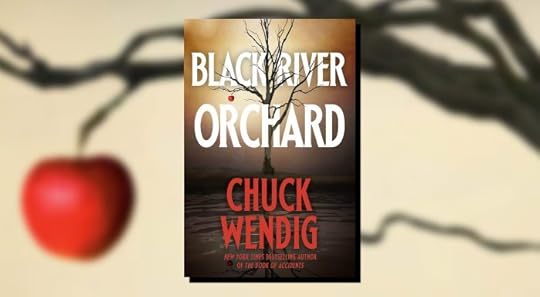
MERRY EVILAPPLEMAS EVE, people. Looks like Black River Orchard is $2.99 today in ELECTRIC BOOK FORMAT for various BOOK-READING MACHINES, which is to say, on Kindle, on Kobo, on Apple, on B&N and on Blitzen, on Donner and — er, sorry, got a little carried away there.
That’s a delightfully not-expensive price for a book that was a USA Today bestseller, and that was named one of the best horror novels of the year by Esquire Magazine, by Paste Magazine, was listed as one of NPR’s Books We Love in 2023, and has gotten similar shout-outs at USA Today and Den of Geek and other excellent places. Hey, it’s got small town suburban folk horror, it’s got cults, it’s got twisted American history, it’s got evil apples and various tidbits of apple learnin‘, it’s got monsters, it’s a real hoot.
So, check it out, if you’re so inclined.
And leave a review, if you can, because that’s what keeps the Review Gods happy, so they do not smite us poor blubbering authors into word gelatin.
OKAY BYE, HAVE A NICE HOLIDAY

December 20, 2023
The Weird Holiday Nowheretimes (And Why Knowing Thyself Matters)

You know how if you have, say, an Important Meeting or Significant Task To Do set at a certain time in the day, that in the run-up to that thing you mostly just sit on your hands waiting for that thing? You’ve got a 2pm whatever, and until 2pm, you’re like a LOADING SCREEN on a new PC game trying to run on a computer that can’t fucking run it. You’re an old iPhone trying to update to the newest OS. You’re stuck. Paused. Caught. Could you technically do other things in this time? Sure. Will you? Probably not. Your brain is frozen in preparation mode. It is languishing in the time-before-the-time. It is the rise up the rollercoaster. You’re buckled in until the drop.
The week before Christmas is exactly that, writ large.
At least, for me.
It’s this weird interstice, this liminal calendar hole, like a temporal trench at the bottom of the ocean into which all things eventually fall.
What I’m trying to say is, I’ve been attempting productivity during this time and it… isn’t happening. It’s not a total waste. I’m not doing nothing. I’m just not doing much of anything. Every effort is an appetizer, not a meal, you know what I’m saying? It happened this year where I had a moment of panic and frustration at myself, YOU STUPID FOOL WHY ARE YOU NOT WRITING THOUSANDS OF WORDS, where I wanted to throw snowballs at my brain like it was an indolent sled dog licking his butthole instead of mushing us across the great ice shelf of the imagination, but then, aaaah ha ha, then I wised the fuck up and I remembered:
This happens to me every year.
Every year!
EVERY. FUCKING. YEAR.
This is just that time. It is, as noted, an interstitial time. It is a period of rest and reflection. I don’t force it to be that. It just is that, at least for me.
Here’s the thing: recognizing that quickly, that this is just Part of My Shit, was very helpful, and honestly, pretty useful in not making me hate myself for this week (and, let’s be honest, next week, too). The last two weeks in December are slow like honey. Cold honey, at that. And then, in January, I tend to pick back up and start churning out stuff, and January through March actually tends to be a fairly good time for writing for me.
The trick is, I saved myself the frustration only because I’ve attempted to take the time and the effort it takes to Know Myself. Which sounds higher-and-mightier-and-self-helpier than I mean it to — there’s no great trick to it, I don’t think, other than, it’s important to live your life and be mindful of patterns. You can then see those patterns and decide if they need to be re-examined and tweaked or if they’re just part of who you are. This is, admittedly, easier said than done — it can be hard to see if something you’re experiencing over and over again with yourself is a bad habit in need of breaking or just one necessary thread in the tapestry of you (okay that was very overwrought and purple prosey, I am sorry, trying to delete), but I dunno. I think you figure that out too by being mindful and living your life in a way where you are careful and thoughtful and most of all forgiving with your own silly ass. Be accepting of yourself, in other words, and your limitations, and your patterns. I think over time you start to see when things need to change and when you just need to realize you (and we all) are a set of imperfections. We’re all hot messes, and sometimes those messes can be cleaned up, and sometimes they’re just part of the colorful chaos of our lives. Long as we’re not hurting ourselves, our prospects, or most of all, anyone else? Then maybe we are who we are and we have to be good with that.
And I think as writers this is really essential too — and I know I’ve talked about this before! — to know who you are as a writer. To know that you get really self-doubty at the 33% and 66% mark of writing. To know what burning out looks like and how to cool it down before you get cooked to cinders. To know when to push, when to back off, and when/how to refill your batteries. (I talk a lot about this in Gentle Writing Advice, by the way, which attempts to unpack a lot of stuff about bullshit writing rules, about burnout and self-care, about how to be productive without punishing yourself.)
I think knowing yourself as a writer ultimately means writing a lot and being mindful of not just the writing but all the extra stuff around the writing — time, place, people, needs, patterns, and so forth.
ANYWAY, whatever, what I’m trying to say is, this time of the year is a slow, goofy, hazy and lazy time of year for me, whether I want it to or not, and I know that trying to force it to be anything other than that is a good way to just hate myself while still accomplishing less than I want. And I know this because I know myself as a writer, and therefore, I’m writing this blog post instead of writing a story today, because hey, fuck it.
Your mileage, of course, may vary.
I’ll pop back in next week to talk about 2023 and what’s coming up for 2024 — I know a lot of people have done those posts already but it always feels weirdly too early if I do them before Christmas, so I’m just going to throw it together sometime next week. In the meantime, to all who celebrate, have a lovely holiday, whatever holiday you care to enjoy. If you want to get me, or any writer, a present, send us a photo of your pet stapled to a bag of money — erm, you should staple the photo to the bag, not show me a photo OF a pet that you’ve stapled to the bag? Shit. Don’t mess that part up, please. Also, you should ensure the bag is one of those cartoony Monopoly-type bags, the kind with the big obvious dollar sign — $ — on the fabric. Stuff it with cash, give us a pet photo, and we will be happy. I mean, fine, failing that, you can always buy our books and leave us a nice review somewhere.
ANYWAY MERRY HAPPY TO YOU, FELLOW APPLE-EATERS

December 12, 2023
How To Blow Up Your Writing Career
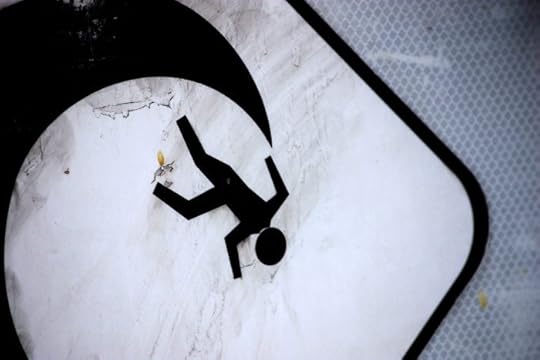
It’s rarely good when Author Drama makes it to NBC. Once your shit hits the national news, you know you fucked up real good.
And yet, here we are — the tl;dr of this is, an upcoming debut author decided to take it upon herself to apparently create a series of sock puppet Goodreads accounts and use said accounts to both
a) boost herself
and
b) trash other books (ostensibly other debut authors, most or all of which were by BIPOC / queer authors)
aaaand then try to cover it up by making up another fake person maybe in order to pin it on, which was immediately called out as nonsense and —
You know, I dunno, it’s a lot. Point is, the author, Cait Corrain, finally claimed responsibility for it in an apology. In this apology, Corrain said it was down to, basically, a nervous breakdown due to substance abuse.
(The apology is on The Website Formerly Known As Twitter, and I prefer not to link to it, but if you wanna find her account, you should at present find the apology still up there.)
I think the… let’s call it easy, maybe even lazy takeaway from this is, hey, it’s messed up to view your fellow writers and authors as competition. They are, at their best, your community, and at worst, a non-factor. Lotta books out there, lotta authors writing ’em, and they’ll be a mix of friends, acquaintances, and people who you simply don’t know. (Okay, fine, you’re allowed one nemesis. Just one! Make it good and choose wisely! This is your nemesis for the duration of your writing career. If they die, another will be selected for you by The Council.) Other writers will lift you up and share wisdom and also share your books with their readers and it’s great. Further, you can do this in recompense to them and also for other authors — we leave a light on, a ladder out, maybe a little cheese plate in case you’re hungry. Authors love books, and as such, we tend to love other authors, too. I mean, no, not every writer is going to be amazing to you (certainly the subject of this entire post belies that notion), but pound for pound, most of the authors I’ve met have actually been pretty great? I like ’em? They’re good eggs.
A book that comes out is not competing with yours. I mean, okay, fine, in a technical sense there is the general problem of money being finite and books being practically infinite and so a reader must make some choices of what to do with their limited money (and time) and so maybe your book makes the cut, maybe it doesn’t. But this isn’t Thunderdome, they may come back for yours later, and books live on the long tail (if publishers allow it) — and, hey, this is why Book Jesus invented libraries. Lotta books there.
And guess what?
They’re fucking free! Rent one for zero dollars and enjoy.
A slightly more nuanced conversation about this is, you know, we live in this sort of deranged hustle-culture capitalist fuckscape world where all our engagement is driven by an algorithmic alchemy of clicks and looks and scrolls and outrage, and we’re all in a box screaming to be heard, and certainly places like Amazon and Goodreads and social media only encourage us to YELL LOUDER and BE BOLDER and GET ATTENTION however we must. Publishers, too, can encourage this when they don’t put their back into marketing a book — when it’s all on the author, the author might start to feel like a frenzied weasel in a box, gnawing for egress. Certainly the GET ON THE STAGE AND PERFORM action is not always the healthiest for authors, nor a skill we are practiced in or have prepared for, and as such, maybe that can crack our shells. We’re good eggs until something chips our shell, and then our mess spills all over the internet.
Thing is, and here’s the real point, ultimately none of that really suggests you should go out and sandbag your imagined authorial rivals in a bigoted push to be the Highlander of Books. What happened here, in this particular situation, definitely feels like some racist shit and I don’t think “engagement farming” or “seeing writers as competition and not community” entirely explains this truly bizarre situation. It definitely seems like a soupçon of mental health issues coupled with some active (or at least poorly-concealed and realized) racism had to be in play. This was a book, after all, that had from what I can tell a pretty good amount of buzz — it had a deal with a big publisher (confession: my own publisher, Del Rey), it had reach, it had a nice cover, it had an Illumicrate placement and —
I mean, the book was going to be fine, maybe even blow up and do pretty well, and now it won’t, because it blew up in a different, and worse, way. The book is gone and I’m not sure the author will easily recover. Again, they’ve apologized, and it’s not on me to decide whether that’s a good apology or a bad one — that’s only on the aggrieved. (And here it’s gotta be worth the mention that you can support the authors targeted and victimized: Bethany Baptiste, Molly X Chang, KM Enright, Kamilah Cole, Frances White. All but the last of those are Bookshop.org links where you can preorder the books — the last is Goodreads, as I couldn’t make Bookshop give me a link for that one, but I’m sure it’ll manifest at some point.)
There’s no real good lesson here — outside of obvious things like, “Hey don’t be weird and do racism and bigotry against your fellow authors?” I want to say, again, be aware of your fellow authors as community rather than competition and try not to fall prey to the teeth-grinding hustle-culture “don’t gotta run faster than the Obscurity Bear just gotta run faster than the author next to me” attitude but mostly, it’s the “don’t be weird and creepy” thing. Be good to other authors, be good to yourself, don’t make it weird. I’m not sure it gets much more complex than that.
November 30, 2023
The Terribleminds Gift Guide 2023
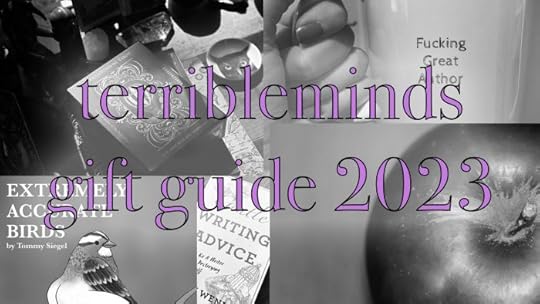
So, once again this year I tackle the onerous task of offering you COOL GIFTS FOR COOL PEOPLE IN YOUR LIFE. Once upon a time, this was more a “gifts for writers” but honestly, the best thing you can do to the writer in your life is to be nice to them, read their stuff, laugh at the parts you’re supposed to laugh at, review their books fondly, pet them, and then leave them the hell alone. (Oh, also, buy for them this neat book I totally didn’t write called Gentle Writing Advice, ahem ahem ahem, okay, sorry, sorry, trying to delete this brash and rampant self-promotion but it just won’t go away oh shit.)
Anyway! Mostly, this is just a “THINGS CHUCK WENDIG LIKES” and you can do with this list as you see fit.
You can also view the previous years’ lists:
2022, 2021, 2020, 2019, 2018, 2017, 2016, 2015, 2014.
Okay, let’s do this.
APPLES
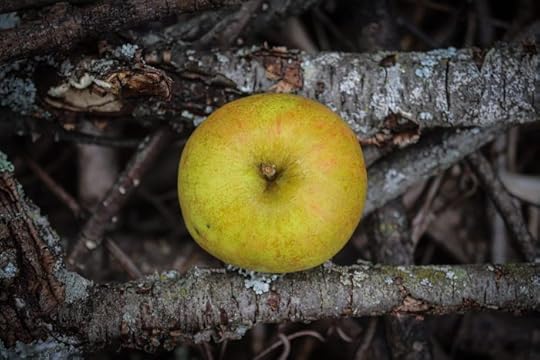
Yep, you can buy apples for people. And you should, because apples are fucking great. The season is just ending, so that means you can still get a lot of solid late-season apples like GoldRush or Arkansas Black. You can get GoldRush here, Arkansas Black here, Northern Spy here. And you can also get them a really great book on apples, like for instance, Apples of Uncommon Character, or the Apples of North America, or if you’re really splurgey, AN ENTIRE FUCKING ENCYCLOPEDIA SET ABOUT APPLES. Yes, I own it. Yes, I am an apple nerd. And I mean, if you also wanted a creepy-ass cult-based small-town-nightmare horror novel about apples I’m just saying, I maybe know a guy who maybe wrote a book you might wanna check out. Hell, if you wanted that book signed and personalized, well, maybe there’s a way to get that and your very own evil apple variety, too.
I know, I know, sorry about the self-promotion. But please buy my books or Santa dies. Ha ha just kidding. *gently gesticulates toward a closed closet door where you can hear mumbled muffled cries for help and also where you detect the faintest scent of gingerbread and elf cologne*
BOOKS

You know what everyone likes, including writers? Books. In no particular order, here are some books I liked this year, and you should buy them all and read them because you are a cool person with impeccable taste:
Samantha Irby, Quietly Hostile; Nat Cassidy, Nestlings; Delilah S. Dawson, Bloom; Ethan Aldridge, Deephaven; Rebecca Solnit, A Field Guide to Getting Lost; Arthur Evans, The Lives of Beetles; Russell Shorto, Amsterdam; Clay McLeod Chapman, What Kind of Mother; Keith Rosson, Fever House; Jaime Green, The Possibility of Life; Chuck Tingle, Camp Damascus; Grady Hendrix, How to Sell a Haunted House; Tananarive Due, The Reformatory; Hanna Jameson, The Last; Susannah Breslin, Data Baby; Naomi Klein, Doppelganger; Gary Whitta, Gundog; Margo Price, Maybe We’ll Make; Tara McLean, Song of the Sparrow (A Memoir); Maggie Smith, You Could Make This Place Beautiful; Eric LaRocca, Everything The Darkness Eats
There is, of course, more that I’m forgetting and my brain is a leaky tugboat, plus there are amazing books by authors like Hailey Piper and Cynthia Pelayo that aren’t even out yet until next year.
Really, though, just get books. Any book. Get a bookish giftcard. Maybe hijack the person, throw them in a car, drive them to a bookstore, hand them thirty-five dollars and see what they buy. Books are the best.
(Oh, my kid recommends Lora Senf’s newest Blight Harbor, The Nighthouse Keeper, sequel to the excellent Clackity.)
TAROT CARDS
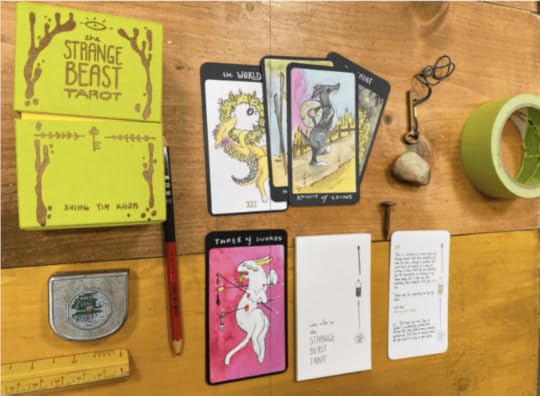
Like a big dork I used to read Tarot for people and while I don’t do that anymore, I do occasionally like to use them not to predict any kind of future, but simply to have as a) objects of pretty fascination and b) objects of inspiration. You can use them as storytelling devices, after all.
I got two new ones this year —
Shin Yin Khor’s STRANGE BEAST Tarot is easily one of the coolest things I own, honestly, and you should get it.
Also the Erin Morgenstern Phantomwise deck, painted by none other than, Erin Fucking Morgenstern, is straight up gorgeous.
AMAZING ART

As we descend into a Hell Era of artificially-generated garbage shit, I do think this is therefore an excellent time to lean extra-hard into supporting art by actual humans and not regurgitating copy-paste machines.
Having worked with Natalie Metzger, I will always tell you to support her work — either buy something directly or join her Patreon either to treat yourself or for a fellow art-beholder.
Mx. Morgan’s illustrations fucking blow me away, so check ’em out.
Tommy Siegel’s Extremely Accurate Birds calendar is hashtag blessed.
Anything, literally anything, by Rosemary Mosco.
Since I apparently am on a bird theme, Josie Morway’s work just knocks the wind out of me so maybe you’ll like it too.
Love Ellie Jordan’s D&D/fantasy folklore art, and I bet you’ll feel the same.
Or god just look at Serena Malyon’s art here.
SO MUCH GOOD ART.
Go get some for you or someone else.
Support humans making human art.
AUTHOR MERCH

I’m sorry, I’m sorry, I know. I know! But I have merch and you can check it out and buy it and then I’ll see you wearing your cool evil apple shirt or a Black Swan pin and I’ll know we are kin and then we will freeze-frame high-five in front of the world and it’ll be great. Go check it out.
Also Jordan (Voidmerch) does collections for a lot of authors, so check out the list of those collections here.
COFFEE COFFEE COFFEE
Said it before, will say it again, Brandywine roasts some of the best coffee around. Small farms, kindly-sourced. Go get it.
FOODS FOODS FOODS

Some foodstuffs I like, and maybe you and your loved ones will dig:
This Little Goat’s chili crunch collection is fucking legit, in particular the chili lime one, mmm. It passes the Flavortown “would eat on a Flip-Flop” test, so, there’s that.
I have always enjoyed Jeni’s ice cream, and though they have a wild variety of excellent flavors, holy shit their vanilla is the best vanilla.
They’re not healthy, but green apple Hi-Chews are legit.
Cocktail syrups are pretty easy to make, buuuuuut, also, if you wanna buy any, Liber & Co brings the tastiness.
I really like vinegar, and Acid League’s citrus vinegar gets regular use in our house. Also their Meyer Lemon Honey, but that doesn’t seem to be on their website anymore — but is in grocery stores I think now. We get it from Thrive Market sometimes, and also, Thrive makes the very best ketchup, it’s Heinz-vibe but even more Heinzy? Or something? Whatever. (I have a referral link to Thrive if you want it. It’s 40% off your first order. I feel like an influencer. Nobody is paying me for this shit, I just found Thrive during the pandemic and like them a lot. Shut up, don’t look at me like that.)
I have become a fan of fizzy non- slash less-sweet beverages. Like, I’m an unabashed Spindrift fan, and CulturePop is really good, and I’d kill a dude for the Sanzo Calamansi sparkling water. Also “Sanzo Calamansi” is the name I use to check into hotels to hide my identity. Shhh.
These chocolates are from Portland, Maine, and I really like them.
But this is the best toffee, from Littlejohn’s.
OTHER RANDOMNESS
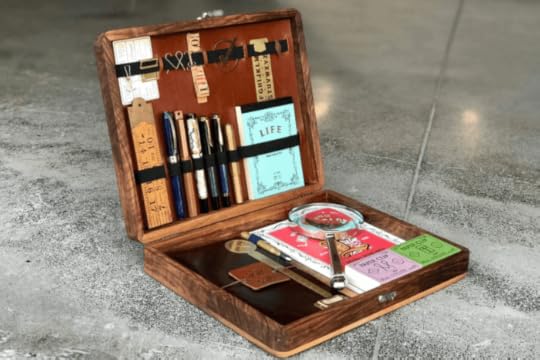
Baron Fig still makes my favorite fancy pen.
If you need good tech organization for computers and phones and such, I’m really quite a fan of TwelveSouth’s products — they’re hale and hardy, they go the distance, and their iPad stand could be used as a bludgeoning baton in a pinch. (It’s actually gotten me pulled at security checkpoints at airports once in a while. “Is this a weapon, sir?” *unfolds stand, places iPad upon it*)
I’ve gotten a couple print magazine subscriptions again — Atlantic, Wired — and not only does it unlock the online versions, but also I’m kinda enjoying reading a thing without getting pop-ups for other things. I am reminded of the BeforeTimes. The world prior to us nuzzling an ever-present digital teat. It’s nice! I mean, I still nuzzle. I’m only human.
Get a good wok and the Kenji book on wok-cooking.
Ok fine fine fine here’s a gift for writers — it’s a walnut box. It’s for writers. It isn’t cheap, but it’s cool, and you can feel DISTINGUISHED as you get it out at your local Starbucks, light up a meerschaum pipe, and begin constructing your next bestseller. I snark, but it is a nice box. (The company also makes a lot of nice pen/pencil cases, too.)
A candle: “Smells like Writer in this bitch.“
Vase: “Girls who don’t read are skanks.“
.
Mug: “Fucking great author.”
OKAY THAT IS IT.
Happy holidays.
Buy my books, leave me a review, put chocolate near my mouth and a bottle of gin in my hand, please and thank you.
November 29, 2023
Social Media Network Report Card (Translation: I’m On Threads Now?)
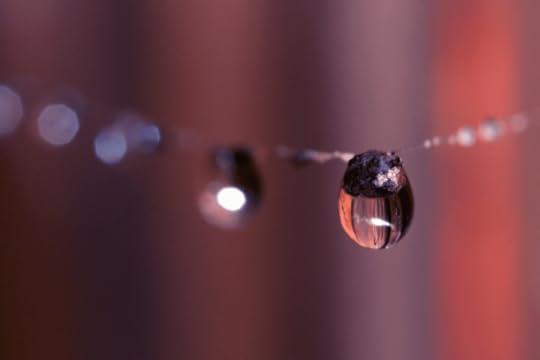
So, how are the various social media platforms doing? Are they worth your time as a person, as a writer, as seven possums in a trenchcoat? Given that community and audience are both found and earned through these social networks, I figure it’s worth taking a gander at them again as I’ve done a number of times over the last year — in part because the social media landscape has broken into a number of little islands thanks to various tectonic shifts beneath the internet crust and we’re all just trying to find a place to rest our digital heads at night. Also in part because, as a writer, I need to find not just a place to HAWK MY WORDY WARES, which is of dubious value, but rather a place where I can meet writers and readers and agents and publishing folks and bookstore people and in general contribute to a larger, greater, cooler bookish ecosystem.
That said, as always, this is all purely my perspective. It is zero percent useful wisdom and one hundred percent just some bullshit that passed through my head like a cloud of stupid. I am not to be listened to. I’m just some jackass with a blog. Proceed with that situational awareness.
Threads.
So, to jump to the start, I’m on Threads now.
It’s fine!
That’s more or less my capsule review. It’s fine! It’s fine. It’s fine.
Some general thoughts about it:
a) It’s obviously tied to Instagram and Facebook and therefore is tied to Zuckerberg which is bad and not good. No, it’s not awesome having to pick your social media platform based on which billionaire sociopath upsets you the least? But it is what it is, I guess. Our choices in life do not always amount to great ones, woefully.
b) If you want the place where the celebrities, the brands, the media outlets, are all going, it’s probably there. It’s got a big crowd — a lot of transfers over from Instagram, I guess? Despite the big crowd I don’t think it feels that peppy as yet. I can’t actually tell how many people I’m following (?) but it seems like a good group. That said, I do see a lot more general activity happening on Bluesky. Still, Threads is not precisely quiet, either, and even in the week since I’ve joined it looks to have picked up a bit.
c) There is a “who you follow” feed, which appears to present the posts of your followed accounts in the order they are posted. But it defaults to an algorithmic FYP feed, which shows a random disgorgement of… I mean, I assume it’s whatever the Insane Robot That Governs The Place wants you to see. It definitely seems to prioritize verified accounts over non-verified.
d) There does seem to be a pretty good bookish crowd of writers and readers.
e) The vibe there is… I dunno, is it wrong if I say, Ruby Tuesdays? Applebees? Like, if Twitter is currently your local Nazi Bar, and Bluesky is your local Eclectic Diner, this definitely feels like a popular-but-functional chain restaurant. People are having a nice enough time and it feels pretty reliable. It’s the “Hey, let’s go to Chili’s” variant of social media. Sometimes, you want that, and that’s okay, no shame.
f) The one thing I like about it in theory but not in practice is the granularity of how you can see your engagement — there’s All, Follows, Replies, Mentions, Quotes, Reposts, Verified, Dunks, Trolls, Posts By People Who Don’t Know What They’re Talking About But Probably Mean Well, Devil’s Advocates, Robots, Dog Photos, Replies From Stalkers, and People Who Still Think NFTs Are Cool. Or something like that. Point is, it’s definitely more granular but… I also don’t feel like each tab works great, and I’m really not seeing a lot of actually existing replies, and the overall GUI of those pages feels noisy and hard for me to parse, for some reason. That might just be me, though.
So, it’s fine! I don’t hate it. I don’t yet love it. It exists and I’m using it and have found some value there and in part that value is finding friends who are using it, too. Which is nice. I wasn’t going to join it but… real talk, writing is a lonely gig and sometimes you want to feel like there’s a room you can go into and hear some voices. Further, publishing is in a place where it’s still not sure exactly how to navigate the shattered social media landscape, and as much as I hate to say it, that means it’s (yet again) on writers to actually carve out their spaces and — well, we’re all just trying to either not die in the abyss or, at the very least, find other people dying in the abyss with us so we can commiserate with one another as we sink softly into the pudding of oblivion.
(Also, The Pudding of Oblivion is my next next novel, out in 2026.)
At the very least, Threads is not Twitter.
Which brings us to —
Twitter.
For a while now, my interaction with Twitter has largely been:
Posting promo. Replying to a few people. Reading DMs. Boosting the signal on stuff that needed (in my mind) boosting. I spent very little time on the site daily. But my new book is finally out on shelves, plus the local school board election is over (we won thank fucking god, the M4L nightmare people are out the door, though not before handing their partner in crime, Superintendent Abe Lucabaugh, a whopping $700k+ retirement package ahhh what the actual fuck), so given that the site is a demented disinformation machine run by a racist emerald mining antisemite fuckface who is now winking at Q-Anon bullshit, I’m all the way out. Account is still there but I’m happy to be not in it. It is a hollow shell.
The bar is a Nazi bar, snout to tail, now.
Bluesky.
I dunno if we’re still calling it BLOOSKY and SKEETING SKEETS or whatever, but I still really like the platform and it works for me. It’s peppy, chatty, and increasingly engorged with good people. It does seem to have lost some of its weird, feral edge — that edge, I think, dulled by a lot of news-flavored stuff getting posted. On the one hand, I really like that it’s becoming more a place to get informed about stuff — on the other hand, I miss people posting Alf Hog and Gandalf Tits and Bird Photos. There was a powerful chaos energy to the earlier days akin to walking into any Waffle House at 3AM — you just had no idea what was going to be on the menu that night. Now, it’s settling into something that feels a little more predictable, like it’s speed-running the Midseason Twitter era. Again, this isn’t necessarily good or bad in terms of assigning it a value — and I may be experiencing something different from what others are experiencing. I do like it though and it remains my Social Media Network of choice.
(And, currently, also the one where I get the most outright engagement. Even compared to places where I have more followers.)
(Also, I have a few Bluesky codes I’m just noticing — if you want ’em, comment below and I’ll toss one atcha.)
Instagram.
I continue to like it. I see photos of dogs and birds and food and books and as such, it is vaguely relaxing and a place to stop. Increasingly it’s pivoting to video and I hate that, mostly, though I’ve popped a few reels up there and they’re fun enough, I guess.
TikTok.
I continue to not be on there or literally see anything that happens there and I’m probably better for it, and you’re probably better not seeing me there, and I think that’s a good decision we’re all making. I do understand that BookTok is currently *checks notes* kind of in control of publishing, whether it realizes it or not, and as such, I guess I should probably be there and be paying attention? At the same time, I can’t control it, and I suspect it would just cause my brain to swell up like an overfed tick and then it would pop and there’d be anxious brain goo everywhere. So, again, I remain here. Without the Tiks or the Toks to keep me warm at night.
Mastodon.
Listen I don’t hate Mastodon at all but I can only do so much. So it’s currently not on my menu. My mind can only handle so many social media platforms before it shits its brainpants. Sorry!
Facebook.
If you need to know what your racist aunt or that guy from high school is up to, Facebook is your jam. I dunno. It seems to throttle links now and ennh. I use it as a walled garden to keep up with family and friends, that’s it.
The Others.
Is Post still a thing? Spoutible? Ello? MySpace? Bramble? Bumblr? Faceyplace? Me-Cave? U-Circle? Hangzone? Lasertag? Are any of these even real? What is happening? I dunno. I’m not on these.
The Blog.
THE BLOG IS ALL
ALL HAIL THE BLOG
WHEN ALL OTHERS SINK INTO THE MIRE
THE BLOG RISES
THE BLOG REMAINS
THE BLOG IS ALL
Or something.
Reminder, you can subcribe if you’re so inclined.
Anyway, that’s it. Buy my books or I die. Bye!
November 28, 2023
December 4th: Last Day To Order Holiday Tomes of Wendig
PSSST. Hey, if you were thinking of ordering one of my books from Doylestown Bookshop for the holidays, the last day they guarantee shipping by the holidays is if you order by December 4th. (That’s not to say you can’t order after that, but at that point, they won’t make the guarantee it’ll get to you in time for whatever mirthful celebration you, um, celebrate.)
Reminder that if you nab a copy of Black River Orchard for me to sign and/or personalize, you also get some manner of EVIL APPLE STICKER and I invent an EVIL APPLE VARIETY all for you, Damien, all for you.
(Details here.)
And I’m throwing in a new offer here, too, as I found these:
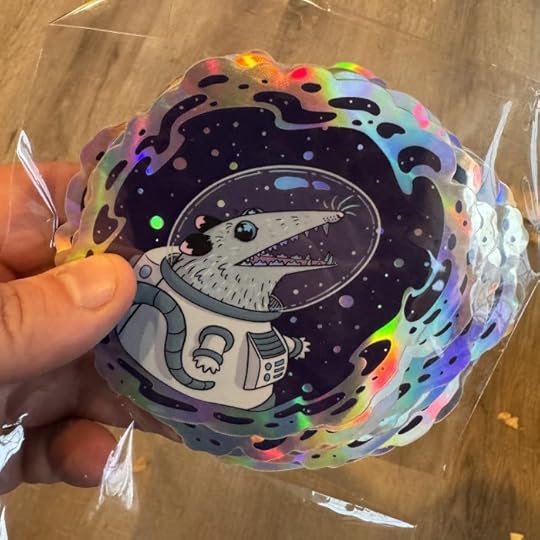
And here you might say, “Chuck, these look like shiny possum stickers, but the possum is also an astronaut,” and you might further surmise, as you are smart, “Hey, I think the brilliant Natalie Metzger designed these,” and on both counts, you’d be right. Ring the bell, you win. The Cosmic Possum is from You Can Do Anything, Magic Skeleton, which Natalie illustrated.
I also have a smaller amount of her Bagel Possum stickers.
So, here’s the new deal —
Order any non-Black River Orchard book of mine from Doylestown Bookshop to be signed and personalized, you get a shiiiiiny Cosmic Possum sticker. (Supply limited, and when I’m out, I’m out.)
(List of my books on their shelves here.)
Order You Can Do Anything, Magic Skeleton specifically, you get both the Cosmic Possum and the Bagel Possum sticker. (Supply limited here, too.)
The same order deadline applies — December 4th.
Again, you can order from the bookstore’s website or call the store directly.
THE COSMIC POSSUM DEMANDS YOU DO THIS.
Or something. Shut up.
ANYWAY.
If you’ve read and enjoyed any of my books, please leave a review somewhere. Amazon, Goodreads, Storygraph, wherever. It helps! It’s nice! It’s a treat! It gives us a small frisson of joy before we sink again into the dark depths of our imagination prisons where we are forced by the demons inside us to continue mining our misery for your entertainment!! Ha ha ha! Just kidding! That doesn’t happen! I have to go now! Definitely not because the DEMONS are getting PUSHY please leave a REVIEW jesus christ
November 21, 2023
Suyi Davies Okungbowa: A Sequel, In Protests
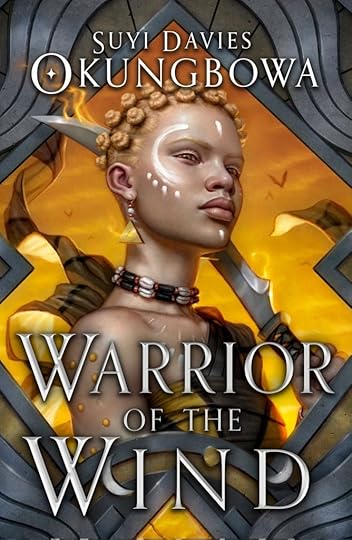
And now, a guest post from gifted writer, Suyi Davies Okungbowa, author of the new novel, Warrior of the Wind.
In the peak days of quarantine during the COVID-19 pandemic, I ordered a bike-in-a-box from Walmart. It arrived stealthily at the front door of my one-room-one-bathroom casita in Tucson, the delivery worker gone before I could offer a tip. I pulled it into the backyard I shared with a student couple and their exuberant border collie. With the toolbox I’d borrowed from my landlord, I put the bike together, tested its sturdiness, and rolled it out into the empty streets.
I had never ridden a bike before. As a child growing up in 90’s Benin City, my parents were not well-off enough to buy one, so I went over thirty years before getting on my first bike. I could say it was great timing that Tucson’s streets were populated only by javelinas and coyotes by the time I got on one, but that’ll be diminishing the devastating effect of the pandemic conditions that made it possible.
Like institutions of education everywhere, the graduate program I was attending at the time had shut down, and for the first time since I moved to the US, I wasn’t teaching a summer class. I spent most days working hard on the first draft of Warrior of the Wind,my second novel under contract for my Nameless Republic trilogy (Son of the Storm, the first, launched in 2021). I took breaks only to call my spouse back home in Nigeria and to take my permitted evening walk or the long hike for a grocery run at Fry’s during the three daily hours they were open with essential staff.
The bike was to be my salvation. I just had to learn how to ride it.
I was having similar challenges with my novel. Second books in a trilogy are infamously difficult to get right, and mine wasn’t any different. Digging into the state of mind of characters who had just found a bit of freedom only to realise they were still being hunted was not something I’d say I had experience with (even though, like most of us during the pandemic, survival was on my mind every day). But I had to find a way to ride this bike, even though I’d never been on one before. My survival—mental, physical, economic—depended on it.
My first few tries on the saddle—bike and book both—were disappointing. I went again. Little difference. I tried each day, hoping for some spark to light the path ahead. Finally, when a spark did arrive—for book and bike both—it was not the one I expected.
On May 25, 2020, news broke that local Minnesotan, George Floyd, was murdered by police action during an attempted arrest.
What followed was a summer of protests fuelled by the discontent felt by Black people in the United States (and allies sympathetic to the experience of living while Black in America), extending to raising awareness to the state of Blackness as a global concept, reverberating with Black people existing everywhere in the world. The feeling of having tried so hard to escape generations of torment, the weight of it passed down (if not physically, then mentally, socioeconomically, and otherwise), only to come out on the other side still being hunted. Alone at home, avoiding the protests downtown (as a non-American, I was concerned about the damage an arrest could do to my immigration status), I channeled my rage and discontent into my sequel novel, realising that I finally understood what these characters were going through. My complicated, messy, too-much feelings were the exact same as those of my protagonists. My path ahead was finally lit, and so was theirs.
I would go on to encounter three more such sparks in the two-ish years it took me to complete writing Warrior of the Wind. After opting not to renew the lease on my casita in Tucson, I left the US for Nigeria in October 2020 for a brief family visit. I was still in the enforced three-day post-travel quarantine in Lagos when the whole country erupted in a weeks-long anti-police-brutality protest now collectively known as #EndSARS. From my quarantine perch, I watched young Nigerians pour into the streets—some crowds were so close to home that I could hear their chants and smell the pungent smoke of burning tyres. Yet another synapse came alight in my brain. Just like the characters in my book—just like the summer I had recently emerged from—they were saying: Enough is enough.
In Son of the Storm, the first book in the trilogy, Danso, a scholar, uncovers long-hidden secrets about the empire in which he serves. His quest for truth inadvertently opens up a can of worms. These exposed truths are received differently. Rightfully, many are aghast, and wish to set their nation right. Rebellion coalitions become on the upswing. But there remain other actors who see these new truths as opportunities to gain power, to plant lies that promise freedom and liberty, yet offer anything but.
Upon returning to the US in January of 2021, I was still unpacking in my new apartment when I watched, with horror, as misguided and malicious US citizens attempted to overthrow a democratic procedure. Sitting there in that empty apartment—surrounded by unopened boxes, new mattress still in its wrapping, TV plugged in on the floor—it felt so surreal, life imitating art like that. My art, in particular. In Son of the Storm, a specific bad actor, who I will not name for spoiler-y purposes, hijacks emergent truths for personal gain, culminating in an uprising that wears the veneer of common good, but rots inside with selfish desire.
My discombobulation and annoyance that all previous attempts to educate had clearly been for nothing was a frustration I shared with my protagonists. In Warrior of the Wind, while being literally pursued by the consequences of truths rightfully exposed, each protagonist begins to consider how to stand up to their assailants. Multiple approaches emerge: Danso, being a scholar, wants to employ stories in service of enlightenment; Lilong, a warrior, wants to hit back where it hurts hardest. Others have different ideas. However, all agree on one thing: always running solves nothing. Standing up, in the small way you can, even against behemoth forces that seem impossible to counter, counts.
Only a year later, I had moved to Canada, and yet again, had barely settled in my new city, Ottawa, when a convoy of Canadians drove trucks into the city and occupied it, blaring ten-wheeler horns throughout the night. I lived downtown, close to the epicenter of it all, and my spouse and I were welcoming a new child into our family. Like Lilong, I was furious, maddened. But like Danso, whose father had once told him, Stories are like knives; weapons, or tools, depending on who is wielding them, I understood why stories mattered—for ill, but also for good. So when I walked those streets, sidling between parked semis, I thought of Danso and Lilong teaching each other a different kind of fighting skill: word and sword. There and then, I decided: This is what I want this book to be for me and anyone out there who needs it. Word and sword.
But I still needed to learn how to ride a bike.
The bike of this book, in particular. Second books in a trilogy are hard for a good reason—you want them to connect the first to the third, but stand in their own right. I remember turning in the first draft of Warrior of the Wind and getting a lengthy editorial note from my editor that amounted to: I know you can do better. As a formerly-touted gifted kid, that was more of a punch in the gut than a flat out, “This sucks.” So I threw myself back, elbow-deep, into the trenches.
Luckily, I did not have to labor for long. These sparks and moments of clarity, albeit on the back of alarming and disconcerting events, arrived at just the right times. They allowed me to, for lack of better parlance, feel my feelings. In opening myself up to feel what I needed to feel in order to work through what was happening in the real world—even when they happened in spaces in which I was still new, still a foreigner in many ways—I could finally open up to what my protagonists were similarly feeling in their own world. When my protagonists turned to darker tendencies, like I sometimes did (Fucking burn it all down!), I felt free to let it happen, to allow them follow their feelings to ends that I wouldn’t. When they struggled to do the right thing, when they failed at it, I let them navigate, because I understood that such impulses are just as human as doing the right thing. I had to let these characters go, to find their own way in the same way I had found mine.
Letting go is the first step to taking control. This was a lesson I learned from bike and book both.
Back in that summer of 2020, after trying and continuously failing to remain balanced on the bike, I entered into YouTube’s search bar: How to learn to ride a bike on your own. One of the video results suggested I take off the bike’s pedals, find a slope, and learn to balance the bike by letting go. Focus on steering, staying upright, and braking at the end of the slope. Focus on what you can control. In a world where things are designed to make you fall, taking control requires first trusting in yourself and letting go.
That evening, despite the city of Tucson’s curfews, I grabbed my new pedal-less bike, went to the top of my street, got on, and let go.
Suyi Davies Okungbowa: Instagram | Newsletter | Website
November 20, 2023
Wisps Of News Make A Nest
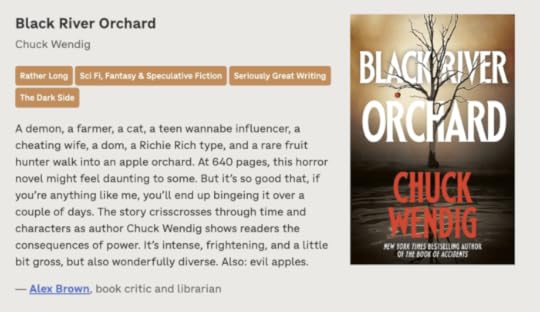
Who wants news? You want news. I know you want news because I can see the news hunger in your bloodshot eyes. You slaver for it. You hiss and shake your head, saliva spattering everywhere! Settle down, news beast.
I am here to feed you.
It looks like Black River Orchard hit NPR’s end of the year BOOKS WE LOVE list, which is a really, really cool list to be on — not only is is among truly excellent company, but hey, holy crap, it’s NPR. That’s so cool. Bonus: it’s tagged under Dark Side (horror stuff!) SFF & Spec Fic, Rather Long (guilty as charged), and hot damn, under Seriously Great Writing.
“A demon, a farmer, a cat, a teen wannabe influencer, a cheating wife, a dom, a Richie Rich type, and a rare fruit hunter walk into an apple orchard. At 640 pages, this horror novel might feel daunting to some. But it’s so good that, if you’re anything like me, you’ll end up bingeing it over a couple of days. The story crisscrosses through time and characters as author Chuck Wendig shows readers the consequences of power. It’s intense, frightening, and a little bit gross, but also wonderfully diverse. Also: evil apples.”
You can check out the whole list here. You’ll also find some excellent book-friends in the form of Tananarive Due, Nat Cassidy, Victor LaValle, SA Cobsy, John Scalzi, Alix Harrow, Daniel Kraus, Isabel Canas, Cassandra Khaw, T. Kingfisher, Paul Tremblay, Lee Mandelo, and more.
Go graze the list. You will be well-fed from it.
(Also, as a sidenote, Black River Orchard also hit the ABA Indiebound bestseller list the week it launched, and I totally did not know that. So it hit that and the USA Today list, too, so hey, I got a national bestseller on my hands. I hope you check the book out and, if so, leave a review at Amazon or Goodreads or Storygraph or somewhere! On a wall! On a human face! Screamed so loud the words carve themselves into the very fundament of reality’s flesh like fissures from a raptor’s talons!)
Let’s see, what else?
Wanderers! It’s on sale for your Kindlewangs and your e-Dongles. It’s $2.99. Why? I don’t know! But if you haven’t checked out this apocalyptic epic, this is an easy opportunity to do so. Amazon, Kobo, Apple, B&N, etc. I’ve no idea how long this is happening — I assume just today? Shrug.
Bonus: it has a sequel, which sometimes people don’t seem to realize, somehow? Wayward is out now in trade paperback. Yay books.
Oh, also, for those who miss The Very Good Boy, Gumball the Golden, from Wayward — please know that I’ve written a novella featuring the dog’s return. The novella, called Whiskey Sour, is set after Wayward, and takes place in Ouray, Colorado. It’ll be part of the Canines & Cocktails trifecta, alongside pals Kevin Hearne and Delilah S. Dawson. Did I show you the cover? I honestly forget if I did; my mind is a sieve. BUT HERE IT IS AGAIN.
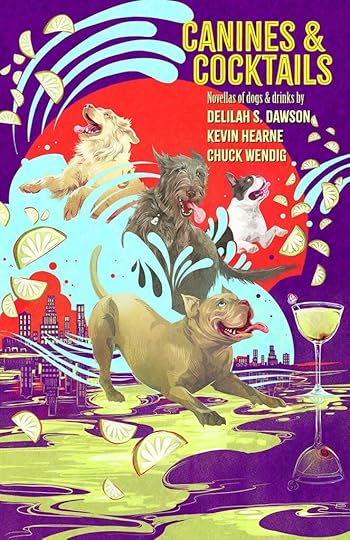
Cover by the inimitable Galen Dara. Release date tba, probably in the first quarter of 2024! More as I know it.
A reminder too that I’m signing/personalizing books for the holidays from Doylestown Bookshop, and that there are some cool bonuses (sticker! your own evil apple variety!) if you do. Details here.
I think that’s about it for now? Now I go back to work. I just finished edits on my next middle grade, called Monster Movie! and that should come out in… fall 2024, I think. And in spring 2025(ish) will be Staircase in the Woods, about five teenagers who find a, well, staircase in the woods in the 1990s, one goes up and never returns, and the others are haunted for the rest of their lives by the loss of their friend and the mystery of where he went.
MORE SOON
OK LOVE U BYE



